calsfoundation@cals.org
Weiner (Poinsett County)
| Latitude and Longitude: | 35º37’13″N 090º53’54″W |
| Elevation: | 246 feet |
| Area: | 1.36 square miles (2020 Census) |
| Population: | 647 (2020 Census) |
| Incorporation Date: | December 2, 1907 |
Historical Population as per the U.S. Census:
|
1810 |
1820 |
1830 |
1840 |
1850 |
1860 |
1870 |
1880 |
1890 |
1900 |
|
– |
– |
– |
– |
– |
– |
– |
– |
– |
– |
|
1910 |
1920 |
1930 |
1940 |
1950 |
1960 |
1970 |
1980 |
1990 |
2000 |
|
232 |
412 |
537 |
447 |
644 |
669 |
715 |
750 |
655 |
760 |
|
2010 |
2020 |
|
|
|
|
|
|
|
|
|
716 |
647 |
|
|
|
|
|
|
|
The town of Weiner in Poinsett County is recognized principally for its rice farming, duck hunting, and unusual name. Since 1977, the town has annually sponsored the Arkansas Rice Festival on the second Saturday of October.
The first known settlers on record were members of the John P. Phillips family, who arrived from Macon, Georgia, in 1866. Other families located nearby, forming the earliest settlement about one and a half miles west of present-day Weiner. In the early years, settlers made their living by hunting, fishing, and raising cattle. The Scott-Raybourn settlement was established a few years later near the site of the present-day Weiner schools. Weiner, a prairie land surrounded by forest, was originally known as West Prairie, and a post office of that name was set up in 1874. Families and pioneers moved into the West Prairie region between 1870 and 1880 as homesteaders.
The construction of the St. Louis and Southwestern Railroad in 1881 led to an increase in population and to the emergence of sawmilling as the chief industry. Ox teams hauled stave bolts and rough lumber from the surrounding woods to be shipped by freight. A depot was built, and the station was called Weiner after a St. Louis, Missouri, railroad official. Homes and stores sprang up nearby, shifting the main part of town to that location. Since the train stop was referred to as Weiner, the town became known by that name even though the township was officially listed as West Prairie, as it still is. The Weiner post office was established in 1884.
Several families of German origin settled in Weiner and nearby Waldenburg (Poinsett County). Many of these and other families came from Midwestern states such as Iowa, Illinois, Kansas, Missouri, and Nebraska, after learning about land being available in the West Prairie area.
A Union church was built in 1900 and shared by multiple denominations for nearly fifty years. A Catholic church was built in 1906 by eight families. As of 2009, Weiner has seven churches: St. Anthony’s Catholic Church, the Disciples of Christ/Christian Church, First United Methodist Church, Weiner First Baptist Church, Church of Christ, Weiner Christian Church, and Assembly of God. Members join annually for harvest and Easter services and maintain a ministerial alliance to assist the needy.
In the early twentieth century, the town of Weiner included a hotel, doctor’s office, photography studio, movie theater, saloon, and numerous stores, and the streets were filled with people shopping and visiting on Saturdays. During the 1930s, a school agricultural building was added under the Smith-Hughes Act, and some rural residents benefited from New Deal policies providing electricity. The Bank of Weiner, which opened in 1909, remained open throughout the Depression. The bank, with Lewis Hogue as its first cashier and later its president, continued to be operated by Hogue descendents until it was sold to Union Planters in 1993. It was later taken over by Regions Bank and closed in 2008. Grundon’s became a popular recreational spot until it closed in the late 1950s. In 1947, the paving of what is now Highway 49 meant that going to Jonesboro (Craighead County) became a common activity for Weiner residents.
The town’s population increased during the 1990s, but Weiner later experienced a loss in businesses and a slight population decline. A chamber of commerce, formed in 1986, has made municipal improvements and works to entice industry and residents.
Education
In 1883, Weiner’s school district began with a one-room schoolhouse. A two-story brick building replaced it in 1915. Other Weiner School District facilities and buildings have been built, razed, and remodeled throughout the years. In the 1940s, nearby rural schools and the high schools of Waldenburg and Fisher (Poinsett County) were incorporated into the district during statewide consolidations. In 1964, the school was integrated with the admittance of the town’s African-American students, who had been attending Booker T. Washington School in Jonesboro. The district also gained students when the local Catholic school closed in 1972. (St. Anthony’s Catholic School had been established in 1920 and served students through the eighth grade.) Weiner’s school activities have always been closely connected to the community, especially its Cardinals basketball tradition. Based on academic achievement, the district received a Golden Apple Award in 2004 as one of the state’s top ten schools. The school’s enrollment for 2007 through 2009 averaged 344 students. Because of the mandated 350 students required under Act 60 of 2003, 2009–10 marks the last year of operation for the Weiner School District, which will be administratively annexed with Harrisburg (Poinsett County). Both Weiner Elementary and Weiner High School will remain in operation within the Harrisburg School District for as long as it proves financially and academically feasible.
Industry
In 1907, Warren Powell Downing, Lewis Hogue, Walter R. Moyers, Charles Thompson, and John G. Probst experimented with farming twenty acres of rice in the area. Other farmers ventured into rice farming, and much was learned for the next two decades through trial and error. As the rice industry grew, more timberland was cleared for fields, changing a large swath of the landscape surrounding Weiner from woodlands to farm land by 1950. Tall concrete dryers for drying and storing rice became a Weiner landmark. The farming surge led to businesses that provided irrigation wells, fertilizer and herbicide, fuel, crop dusting, and farm implements. During the 1940s, farmers turned to soybeans as a rotation crop for rice fields. Improved machinery, chemicals, and methods over the years resulted in higher yields but also decreased the need for farm laborers. Rice farming remains Weiner’s major industry in the twenty-first century.
Attractions
As early as the 1890s, Weiner attracted hunters from other cities and states. Wallace Claypool’s private duck-hunting preserve was featured in 1956 on a national television program, Wide, Wide, World. A photograph from the location depicting more than 500,000 ducks in flight and on the water became a widely displayed print. During the 1950s, Weiner was referred to as the “Duck Capital of the World.” Duck hunting is still popular, although the number of ducks has decreased from the earlier years. Nearby Lake Hogue and the Bayou DeView Wildlife Management Area provide fishing and hunting opportunities.
In 1977, Weiner held its first annual Arkansas Rice Festival for the purpose of promoting rice. The event features a rice tasting, rice cook-offs, a Miss Rice Festival pageant, rice industry displays, and various booths and entertainments.
For additional information:
Lynch, Leila. Through the Years in Weiner, Arkansas: 1866–1971. Jonesboro, AR: Gerald Bryant Printing, 1971.
Poinsett County Historical Society. Poinsett County, Arkansas: History and Families. Paducah, KY: Turner Publishing Company, 1998.
Sitzer, Mary Jean. “Preserving a Catholic Community: The History of St. Anthony’s Catholic Church in Weiner, Arkansas.” PhD diss., Arkansas State University, 2021.
Ina Raye Hurdle
Weiner, Arkansas
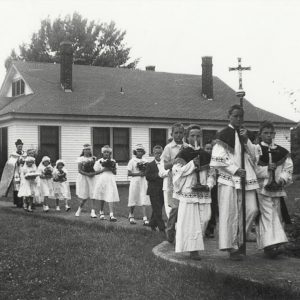
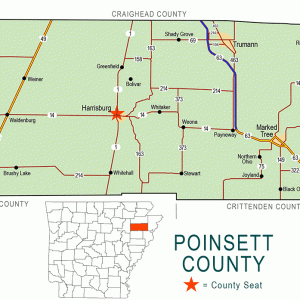
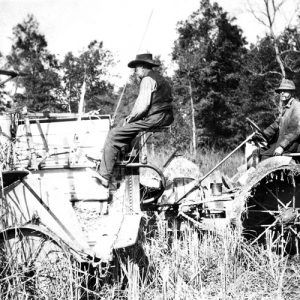
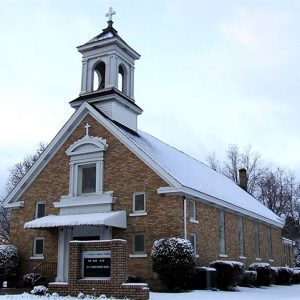
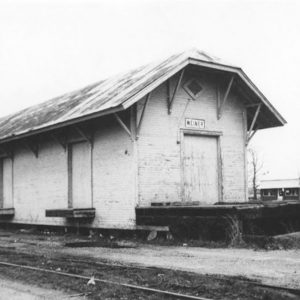





I was nine years old in 1954-55 when we lived on what my parents called the Keller Settlement near Weiner on Halls Lane, I think it was. I was in the 3rd grade at Weiner Elem. School, and my teacher was a lady named Mrs. Kasserman. The winter of 1954-55 was a very hard one for us. If it hadn’t been for the fish out of the rice canals and the ducks and my dad trapping we’d probably have starved to death. My mom told my dad that when the weather got warm, she and the kids were moving back to Tennessee and he could stay there and starve if he wanted to. I didn’t understand a lot of things then, and I was one homesick little boy when we moved to Lawrence County, Tennessee. All my dad’s people were from the Jonesboro/Trumann area, but over time all of them have died or moved away. I still think of Weiner with affection and have been back a couple of times. But, as the saying goes, “You can’t go home again.” I still remember the names of some of the people: the Dick Hall family, Gurney and Annabell West who ran a store, Wayne Keller who flew a airplane that sprayed the crops, Buel and Silvia Keller, Trig Keller, and a old fellow named Valentine Calender, I think it was.